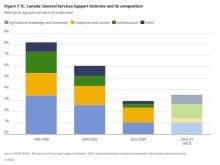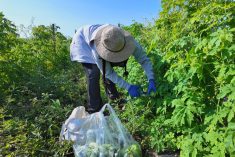Glacier FarmMedia – Agriculture and Agri-Food Minister Marie-Claude Bibeau maintains farmers who need cash should first look to any available money sitting in AgriInvest accounts
“The last numbers I’ve seen did not show that farmers had used their accounts very much. Some sectors a little bit more, but not in a significant way the last time I looked at it, but that was a few weeks ago already,” Bibeau said during an Aug. 13 interview. “I would say it was a bit disappointing to see that.”
Read Also

Melancthon faces a new quarry fight over water, environment and farmland risks
A proposed Strada blast quarry in Melancthon, Ont., sparks regional debate over water protection, farmland sustainability, and Ontario’s aggregate policy.
Producers have between $2.27 billion and $2.37 billion sitting in their AgriInvest accounts.
Asked how she responds to criticism from political opponents and producer groups that say the amounts in accounts are insignificant — most have $10,000 or less available — Bibeau continued to push for the money to be spent.
“This (program) is meant to provide support in the very short term, as the first line of safety net. It’s easy to access, because you already have it in your account. You’re supposed to put this money aside every year so if you face an extraordinary challenge you have this money quickly available, and then you can wait a bit longer or have access to other programs, like AgriStability, AgriRecovery or AgriInsurance if the needs are greater,” she said.
“This is the path within the BRM (business risk management) programs, so even if it is not a big amount for some producers, and I would put big in brackets because it’s a relative number, but it’s supposed to be the first line of support available and not using it sends the message you don’t really need it.”
Bibeau stated there is also confusion over how the program is used, saying a discussion is necessary between her, her provincial counterparts, and industry stakeholders.
Her comments won’t be appreciated by producer groups who argue the billion-dollar figures are misleading and more support is needed due to the insignificant amounts available in individual accounts.
Bibeau remains committed to changing business risk management programs and is attempting to lay the groundwork for a potential major overhaul of what is currently offered.
“COVID is giving us, I’m not sure if it’s an opportunity, but the occasion, to evaluate how they are helping in cases of crisis,” she said, noting each program continues to be evaluated on whether or not they are reaching their objectives.
Bibeau said, “everything is on the table” for a deeper reform of the programs, but it won’t happen anytime soon. The current federal-provincial-territorial deal governing BRMs doesn’t expire for a few more years.















